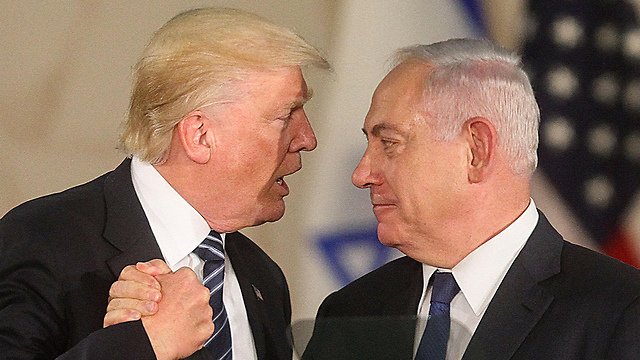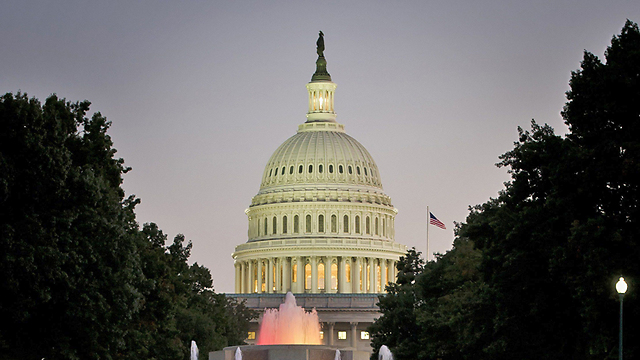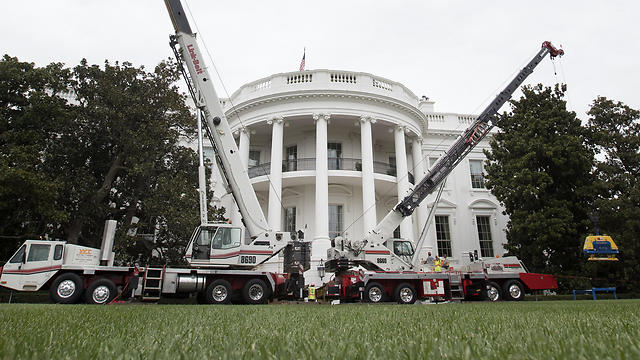The US vice president’s festive visit to Israel ended on a troubling note. While Mike Pence and his wife Karen boarded Air Force Two, the Pew Research Center released its latest findings on American views of Israel.
It was, without a doubt, a warm and embracing visit: The almost Zionist speech at the Knesset, the visit to the Western Wall, the embassy move and the glasses of wine from the Psagot Winery in the Binyamin region. But the reality of relations, as revealed in the Pew survey, is complex and not as rosy.
In America, where partisan polarization is growing, Israel has been added—courtesy of our very own prime minister—to the list of bones of contention between Democrats and Republicans. According to the Pew national survey, 79 percent of Republicans sympathize more with Israel than with the Palestinians, compared to just 27 percent of Democrats.

Trump and Netanyahu. Betting on one horse is a gamble on the future of the Jewish people (Photo: AFP)
The two parties differ markedly in opinions about Benjamin Netanyahu as well. Fifty-two percent of Republicans have favorable impressions of Israel’s leader, compared to only 18 percent of Democrats.
As far as the Democrats are concerned, the Israeli government no longer symbolizes the shared values that the alliance between the two countries is based on—commitment to democracy and the rule of law, freedom of religion and speech, protecting human rights and advancing peace.
So we can say “to hell with the Democrats,” but the problem is that in American politics the Congress and White House leadership can be replaced every two years. Another problem is that the majority of the US Jewry supports the Democrats. So betting on one horse is not just a gamble on Israel’s future; it is no less a gamble on the future of the Jewish people.
The survey shows that Democrats in older age brackets sympathize more with Israel, while members of the younger generation—aged 18 to 30—are more divided in where their sympathies lie in the Israeli-Palestinian dispute.
Another alarming figure is how Israel is seen among those who define themselves as liberals. The share of liberal Democrats who sympathize more with Israel than the Palestinians has declined from 33 percent to 19 percent in the past two years, while nearly twice as many liberal Democrats (35 percent) say they sympathize more with the Palestinians than with Israel.
This last figure must ring a few bells here, considering the fact that the liberal faction sets the tone in the Democratic Party today. It enough to look at the potential 2020 presidential candidates to understand that whoever wants to win the Democratic Party’s primary elections must position himself or herself as liberal as possible.
The intimate ideological hug between Netanyahu and Trump may help the two leaders in their respective political support base, but as it grows stronger—we move further away from the Democrats, and not just from them.
The midterm elections, which will be held in the United States in 10 months, usually have the potential of increasing the opposition’s power in the House of Representatives. It is believed that the Democrats could go back to leading the House of Representatives and maybe even the Senate. Israel can’t afford to reach the presidential election with such a clear partisan divide in Middle East sympathies.
Capitol Hill. Israel can't afford to reach the next presidential election with such a clear partisan divide in Middle East sympathies (Photo: AFP)
Moreover, different surveys conducted by the same research institutes among the Jewish American public have shown that 70 percent of US Jews define themselves as Democrats, and 50 percent of these Democrat Jews define themselves as liberals. This goes to show that while support for Israel among evangelical Christians is thriving, support for Israel among Jews has reached a historical low.
The figures point not only to a political rift, but to a rift between the State of Israel and the Jewish people in the US, a public which will always serve as Israel’s main base of support in America.
The attack on Israeli democracy, the diplomatic rejectionism, the practical renouncement of the two-state solution, the cancellation of the Western Wall egalitarian area plans, the cold shoulder given to Reform and Conservative Jews, the attacks on Obama, and Trump’s embrace have all led to the creation of this big, dangerous rift. Prime Minister Netanyahu was quoted in the past as estimating that the Reforms and Conservatives would disappear within two generations as a result of assimilation and lack of reproduction, but the opposite is actually happening—US Jewry is thriving and expanding (although not according to the Israeli Rabbinate’s definitions), while becoming more liberal and much more critical towards Israel and the government’s policy. This is a wakeup call for the Israeli government and opposition. The State of Israel cannot afford, neither politically nor ideologically, to give up on those who have supported it thus far. We can enjoy the hand extended from the White House, but we must not forget that the house’s tenants are replaced every four to eight years and that it is our duty to be prepared for the post-Trump era.Yael Patir is the director of the Israel Program at J Street.
Trump’s embrace could lead to dangerous rift with US Jews : http://ift.tt/2FUEHJp

No comments:
Post a Comment